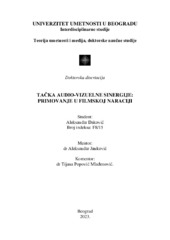| dc.contributor.advisor | Janković, Aleksandar | |
| dc.contributor.other | Masnikosa, Marija | |
| dc.contributor.other | Nikolić, Mirjana | |
| dc.contributor.other | Filipović, Aleksandar | |
| dc.creator | Đaković, Aleksandar | |
| dc.date.accessioned | 2023-08-10T10:01:36Z | |
| dc.date.available | 2023-08-10T10:01:36Z | |
| dc.date.issued | | |
| dc.date.submitted | 2023-08-10 | |
| dc.identifier.uri | http://eteze.arts.bg.ac.rs/handle/123456789/628 | |
| dc.description.abstract | Primovanje se odnosi na fenomen u kom izloženost stimulusu utiče na kasnije misli, osećanja, prosude i ponašanja. Primovanje se može desiti kroz različite senzorne modalitete stimulusa-primova, kao što su vizuelni, slušni ili semantički znakovi. Narativni filmovi kao oblik audiovizuelnog pripovedanja koji prenose priče korišćenjem: vizuelnih slika, muzike, zvuka, dijaloga, likova i razvoja radnje; stvaraju idealnu sredinu za mnoštvo stimulusa koji se mogu posmatrati kao „primovi“ i služiti u svrhu primovanja. U kontekstu narativnih filmova, primovanje se dešava kada specifični elementi u filmu, kao što su vizuelni prikazi, muzika, dijalog ili različiti motivi i teme, aktiviraju povezane koncepte ili asocijacije u umu gledaoca. Ova disertacija ispituje koncept primovanja u narativnim filmovima i njegove efekte na percepciju, reakciju, spoznaju i prosudu publike. Studija istražuje kako primena primovanja funkcioniše unutar narativne strukture filmova i kako utiče na različite kognitivne i emotivne procese. Studija takođe istražuje kako različite kinematografske tehnike i strategije pripovedanja mogu da dovedu do izražaja određene koncepte ili emocije kod publike kroz sve primenjive tipove i načine primovanja. Ispitujući interakciju između psihološkog primovanja, ljudskog uma i narativnih filmova, ova disertacija ima za cilj da otkrije složene mehanizme koji leže u osnovi uticaja filmskog pripovedanja na naše kognitivne procese, emocionalna iskustva, prosudu i interpretaciju stvarnosti. Sistematizacijom osnovnih mehanizama psihološkog primovanja i njihovom komparacijom u kontekstu narativnih filmova, ovo istraživanje ima za cilj da otkrije različite načine na koje filmski narativi oblikuju naše emocije, stavove i procese donošenja odluka. Multidisciplinarnim pristupom koji obuhvata psihologiju, filmske studije, muzikologiju, neuronauke i druge kognitivne nauke, studija takođe nastoji da osvetli uticaj filmova kao moćnih sredstava za primovanje i manipulaciju našim kognitivnim i emocionalnim stanjima; ali pre svega da ispita potencijal primovanja kao sredstva i načina naracije. Ispitivanjem složenih odnosa između tehnika pripovedanja, efekata primovanja i odgovora publike, ova disertacija nastoji da doprinese dubljem razumevanju kompleksne interakcije između umetnosti filmskog pripovedanja i složenosti ljudske psihe. | en |
| dc.description.abstract | Priming refers to the phenomenon in which exposure to a stimulus influences subsequent thoughts, feelings, judgments, and behaviors. Priming can occur through various sensory modalities of prime stimuli, such as visual, auditory, or semantic cues. Narrative movies, as a form of audiovisual storytelling that convey stories through visual images, music, sound, dialogue, characters, and plot development, create an ideal environment for a multitude of stimuli that can be observed as “primes” and serve the purpose of priming. In the context of narrative movies, priming occurs when specific elements in the film, such as visual representations, music, dialogue, or different motifs and themes, activate related concepts or associations in the viewer's mind. This dissertation examines the concept of priming in narrative movies and its effects on audience perception, response, cognition, and judgment. The study explores how the application of priming operates within the narrative structure of films and its influence on various cognitive and emotional processes. The research also investigates how different cinematic techniques and storytelling strategies can highlight specific concepts or emotions in the audience through various applicable types and modes of priming. By examining the interaction between psychological priming, the human mind, and narrative movies, this dissertation aims to uncover the complex mechanisms underlying the impact of film storytelling on our cognitive processes, emotional experiences, judgment, and interpretation of reality. This research aims to uncover various ways in which film narratives shape our emotions, attitudes, and decision-making processes by systematically examining the fundamental mechanisms of psychological priming and comparing them within the context of narrative movies. Through a multidisciplinary approach encompassing psychology, film studies, musicology, neuroscience, and other cognitive sciences, the study also aims to shed light on the influence of movies as powerful means of priming and manipulating our cognitive and emotional states, but primarily to explore the potential of priming as a means and method of narration. By examining the complex relationships between storytelling techniques, priming effects, and audience responses, this dissertation seeks to contribute to a deeper understanding of the intricate interaction between the art of film storytelling and the complexities of the human psyche. | en |
| dc.language.iso | sc | en |
| dc.publisher | Универзитет уметности у Београду, Интердисциплинарне студије Универзитета уметности | sr |
| dc.source | Интердисциплинарне студије Универзитета уметности | sr |
| dc.subject | primovanje, filmska naracija, filmska muzika | en |
| dc.subject | priming, film narration, film music | en |
| dc.title | TAČKA AUDIO-VIZUELNE SINERGIJE: PRIMOVANJE U FILMSKOJ NARACIJI | en |
| dc.type | doctoralThesis | en |
| dc.contributor.coadvisor | Popović - Mlađenović, Tijana | |


